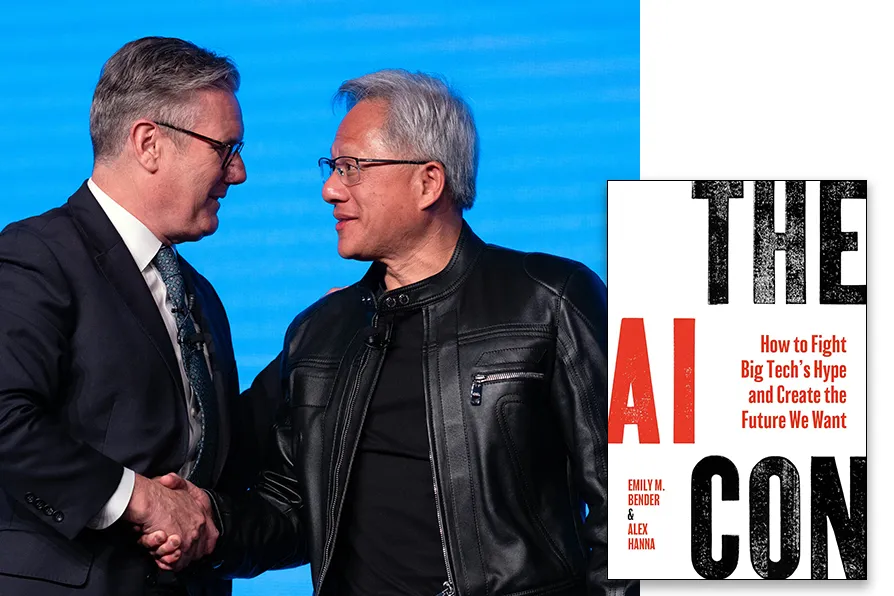The Bard stands with the Reformers of Peterloo, and their shared genius in teaching history with music and song
IAN SINCLAIR welcomes a lucid critique of a technology that reproduces and enables oppression, power, and environmental devastation

 INVIDIOUS: Keir Starmer and Jensen Huang, CEO of Nvidia, at London Tech Week, June 9. Stramer announced the TechFirst programme for secondary schools to put the technological power "into the hands of the next generation".
INVIDIOUS: Keir Starmer and Jensen Huang, CEO of Nvidia, at London Tech Week, June 9. Stramer announced the TechFirst programme for secondary schools to put the technological power "into the hands of the next generation".
The AI Con: How To Fight Big Tech’s Hype And Create The Future We Want
Emily M Bender and Alex Hanna, Bodley Head, £22
LAST month, Sam Altman, the CEO of Open AI, claimed “a kid born today will never be smarter than AI [artificial intelligence], ever.” A couple of days before, Demis Hassabis, the head of Google’s DeepMind, told the Guardian: “We’ll have something that we could sort of reasonably call AGI [artificial general intelligence], that exhibits all the cognitive capabilities human have, maybe in the next five to ten years, possibly the lower end of that.”
With hype about AI at fever pitch, the new US-centric polemic from Emily M Bender, professor of linguistics at the University of Washington, and Alex Hanna, a former senior research scientist on Google’s Ethical AI team, couldn’t be more timely.
“AI is a marketing term” and the tech barons of our age are great admen, they argue. “It doesn’t refer to a coherent set of technologies” but is used to boost profits, making money by “getting others to believe that their technology is similar to humans.” And we are talking about a huge amount of dosh — so far this year the largest companies in the US have invested £117 billion in the development of AI, according to the Guardian.
Bender and Hanna prefer the term “automation” to “AI,” with large language models (LLMs) such as ChatGPT the most prominent type. The problem for the AI boosters is there is nothing remotely intelligent or sentient about LLMs. As one academic paper noted last year, they “simply aim to replicate human speech or writing” which “they do by estimating the likelihood that a particular word will appear next, given the text that has come before.”
Accessible and informal, much of the book surveys the myriad problems with the increasing use of automation in healthcare, the criminal justice system, welfare, higher education and the creative industries. For example, the company SoundThinking sells ShotStopper to municipalities across the US, claiming their product is “a proven acoustic gunshot detection system” with a 97 per cent accuracy rate. However, audits in Chicago and New York City found between 87-91 per cent of alerts were false alarms — a recipe for disaster when you have armed police.
For Bender and Hanna, “government processes that affect people’s liberty, health and livelihoods require human attention and accountability” rather than automation.
They also note how apparent human-levels of competence of systems sold as “AI” are often the result of work done by actual humans, commonly working in exploitative conditions in the global South. They highlight several cases of this hidden labour, including workers in Kenya, Uganda and India tasked with labelling disturbing internet content for the purpose of training models such as ChatGPT.
A broader critique they have is that AI hype tends to devalue what it means to be human, though frustratingly they don’t explore this interesting notion in any depth. Certainly my sense is the more outlandish claims about AI are frequently made by those with a techno-optimist, instrumentalist view of humanity and an attendant lack of interest in the complexity of people’s lives and the jobs they have.
“AI development is not inevitable,” the authors boldly state, concluding with a chapter on how people can fight back as individuals (by asking critical questions), in the workplace (through unions) and at the national level (through strong regulation). And like the 18th century Luddites whom they laud throughout the book, they are at pains to clarify they are not anti-technology: “We want technology that is created to strengthen and empower communities, not technology that reproduces and enables systems of oppression, consolidation of power, and environmental devastation.”










